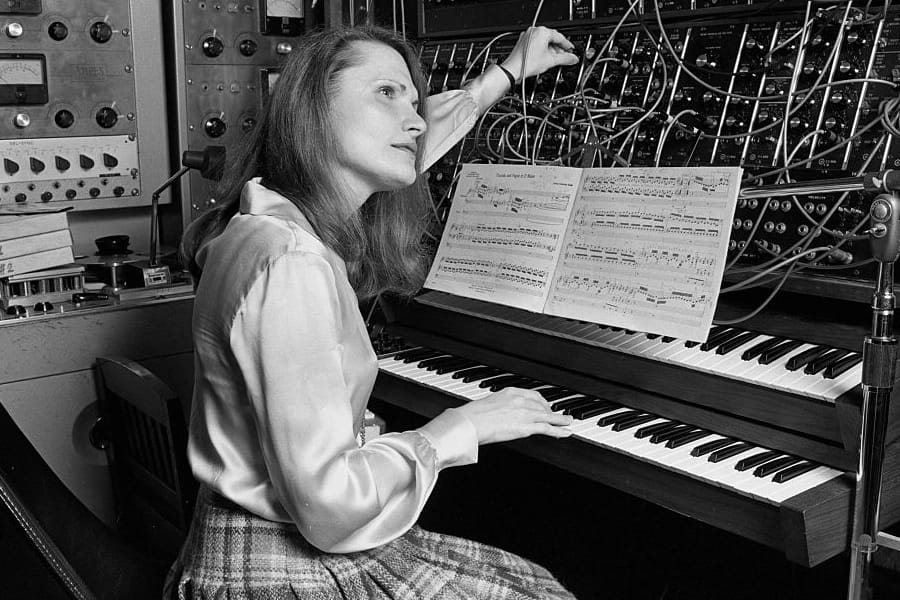
articles / Culture
Wendy Carlos: Synth Visionary

Electronic music composer Wendy Carlos at work in her New York City recording studio, October 1979 | Photo by Leonard M. DeLessio/Corbis via Getty Images
Wendy Carlos is a pioneering composer and performer of electronic music who introduced the world to a new sonic palette in the form of synthesized sounds. She was born Walter Carlos in 1939 in Pawtucket, Rhode Island, eventually transitioning to female in the 1970s and taking the name Wendy. She began studying piano at the age of six and was a precocious student with an aptitude for math. She studied physics and music at Brown University, subsequently obtaining a master’s degree at the Columbia-Princeton Electronic Music Center under the tutelage of Vladimir Ussachevsky, an experimental electronic composer. While at Columbia, she also began working closely with Robert Moog, an engineer and the manufacturer of the Moog synthesizer, the first synthesizer made for commercial use. Carlos advised Moog on technical refinements to the instrument, particularly with regard to musical expression and tone color. Moog said of her expertise: “[Wendy] used techniques that had been available for years—but used them better.”
Around 1967, Carlos met Rachel Elkind, executive secretary to Goddard Lieberson, the president of Columbia Records, who would become her producer. Elkind quickly recognized Carlos’s talent after hearing her Moog rendition of J.S. Bach’s Two-Part Invention in F (BWV 779), and suggested producing an entire album of Bach transcriptions. The result was Switched-On Bach (1968), a reimagining of Bach favorites on the Moog synthesizer. Switched-On Bach was an unexpected smash hit, becoming the first platinum-selling classical album. It remains one of the best-selling classical albums of all time. Three other albums of Baroque transcriptions followed: The Well-Tempered Synthesizer (1969), Switched-On Bach II (1973), and Switched-On Brandenburgs (1980).

Album cover for Switched-On Bach, showing an actor dressed as Bach standing in front of the Moog synthesizer.
Carlos envisioned the Bach albums as a means to show off the capabilities of the synthesizer, which she believed was especially well-suited to contrapuntal music. Today, we think of the synthesizer as synonymous with a keyboard, but unlike a modern keyboard, the original Moog synthesizer could only generate a single note at a time. Creating an entire composition thus involved crafting the sound of each note and then combining recordings of each musical line through a painstaking multitracking process. In a 1989 interview with BBC Two, Carlos demonstrates multitrack mixing on an 8-track and generating sounds on both a Moog synthesizer and a modern digital synthesizer:
Despite her early acclaim, between 1969 and 1979, Carlos disappeared almost entirely from public view, finding it increasingly difficult to maintain an outward appearance as a man while feeling as though she were a woman. Not long after the release of Switched-On Bach, she began her gender transition by taking hormones. She began living mostly as a woman and only appeared as Walter when she was forced to make public appearances to promote her work. At a 1969 engagement with the St. Louis Symphony, Carlos recalled struggling to leave her hotel room dressed as a man: “I began crying hysterically. I couldn’t do it. Rachel [Elkind] cajoled me. Eventually I pasted on my sideburns and put on a wig to hide my hair, which was pretty long at the time and streaky. I filled my pores with dirt from an eyebrow pencil to simulate five-o’-clock shadow. I tried to lower my voice as bottom-heavy as it could get. Tried to be macho. It couldn’t have mattered less.” Carlos eventually had sex reassignment surgery and came out as transgender in a candid 1979 Playboy interview. She said of this dark period of her life, “I lost a decade as an artist.”
In addition to her vast contributions to the development and improvement of synthesizer technology, Carlos has been a prolific film composer, scoring A Clockwork Orange (1971), The Shining (1980), TRON (1982), and Woundings (1998). As in Switched-On Bach, Carlos created new sonic landscapes out of older music for the title themes of A Clockwork Orange and The Shining, drawing inspiration from Henry Purcell’s Music for the Funeral of Queen Mary (1695) and the plainchant melody Dies Irae, respectively. Listen to Purcell’s music and Carlos’s score side-by-side:
Trailer for A Clockwork Orange, featuring the title theme, based on the March from Purcell’s Music for the Funeral of Queen Mary (1695).
Baroque Brass of London, March from Music for the Funeral of Queen Mary.
A Clockwork Orange infamously contained scenes of the protagonist being tortured by being forced to watch Nazi film reels while listening to the eerie sound of synthesized voices performing the last movement of Beethoven’s Ninth Symphony. The voices were produced using a vocoder—the same technology later used by groups such as Daft Punk. In TRON, Carlos blended the sound of a real orchestra with synthesized sounds to achieve new timbral effects.
Carlos spent years synthesizing a library of digital sounds with the aim of replicating the complex timbres of a full orchestra, culminating in the album Digital Moonscapes (1985), which features a synthesized double orchestra. From the 1980s onward, Carlos increasingly explored alternative tunings beyond equal temperament, particularly in Beauty in the Beast (1986) and Secrets of Synthesis (1987). Carlos called Beauty in the Beast her most important album musically. According to Carlos, her aim was to produce “familiar-yet-strange” timbres that had a “beautiful plus beastly” quality, using tunings from sources as diverse as Balinese gamelan and traditional Buddhist music from Bhutan and Tibet. Carlos had a funny side as well, collaborating with “Weird Al” Yankovic on a 1988 parody of Peter and the Wolf and Carnival of the Animals. In 1992, she issued Switched-On Bach 2000, a reworking of her original Switched-On Bach using tunings prevalent in Bach’s time. Tales of Heaven and Hell (1998) meditates on themes of good and evil, revisiting material from A Clockwork Orange in the piece Clockwork Black.
In recent years, Carlos has remastered and reissued many of her original albums so listeners could experience them the way she felt they were meant to be heard, using new digital technologies to improve the clarity of sound. She has also resurfaced material from her original film scores that was cut during production on the album Rediscovering Lost Scores (2005). Carlos won three Grammy awards in 1969 for Switched-On Bach and was honored with the SEAMUS Lifetime Achievement Award in 2005 for her contributions to electronic music.






